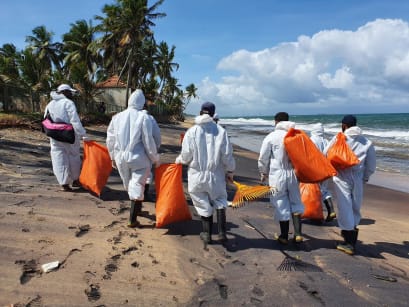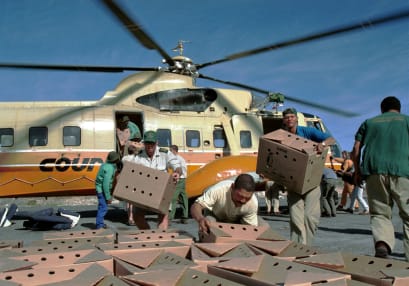
Our Science, Technology Stakeholder Engagement (STSE) team has been working with internal collaborators and external stakeholders to help identify and pursue novel technologies, techniques, and approaches in its efforts to advance spill response.
OSRL's involvement in academic response-related research ensures that our operational experience is injected into the research programmes to produce outputs with more direct relevance and application to improve future spill response techniques and capabilities.
This year, we have already been proactive in our outreach with educational institutions and individuals wishing to explore a career in science, technology, and response. Here are some of the areas we’ve been working in already and what we have planned for our future outreach and development.
Work experience with OSRL: Inspiring the next generation
Over a fortnight at OSRL, we welcomed a dynamic team of work experience students, who immersed themselves in the world of oil spill preparedness and response, gaining real-world insights through a range of hands-on activities, engaging presentations, and team collaboration. From learning about the fates and effects of oil and what a career in response entails, to taking part in aviation practical sessions, offshore operations, and SCAT (Shoreline Clean-up Assessment Technique) exercises, they experienced the full breadth of our capabilities. The group explored our base facilities, including a look at the full kit and PPE that a responder would be provided with upon enrolment, and learned about environmental sensitivities, tiered preparedness, and wildlife response.
Throughout the programme, they tackled scenario-based tabletop exercises and presented their findings. They learnt about relevant areas in our organisation, from dispersants to EHS (Equipment Hire Services), and were given opportunities to collaborate on RoboGeo and drone applications. The students finished their experience with a strong understanding of our mission and operations, and we hope they received a memorable introduction to the response sector.
OSRL impact on education
Recently, we have made significant strides in education, outreach, and community impact, demonstrating our commitment to nurturing future talent. We have actively engaged with 24 UK academic institutions, collaborating with lecturers and participating in career fairs and workshops to raise awareness of career opportunities in the oil spill response sector.
Our STEM outreach efforts have focused particularly on encouraging young people, especially women, to pursue careers in science and engineering, with tailored university sessions that highlight our industry's role and relevance.
At this year’s Interspill, we co-hosted a thought-provoking panel session with our members on the themes of competency and responder retention, where we also explored how to inspire and equip the next generation of oil spill professionals.
Over the last few years, we have worked with Exeter and Essex Universities on two PhD research programmes on new marine ecotoxicology tools and exploring marine oil snow respectively. Papers have been published and one of the graduates is a senior toxicologist at one of our Member companies- a great success story.
Since launching our annual Master’s scholarship programme in 2023, we have proudly supported three students with their academic pursuits at two UK institutes. Extending our impact beyond education, in July 2024, OSRL Ghana partnered with Bayfield Oil Services Ltd to open a new computer lab at the Sekondi School for the Deaf in Ghana’s Western Region, which created meaningful access to technology for young learners and reinforced our commitment to inclusion and community development.
Looking ahead, our focus is on expanding our efforts to attract the next generation of oil spill response professionals. We are preparing to host a dedicated ITAC workshop centred on the recruitment and retention of new talent in the industry, continuing the conversation on how to build a sustainable, skilled workforce.
Globally, we are broadening our academic outreach to new regions, with targeted engagement planned across South America, the Middle East, Africa, and Malaysia to build stronger links with universities and research institutions. As part of our pledge to supporting education, we will also be awarding the next round of OSRL Master's and PhD scholarships for 2026 projects, aligning student research with member needs while enabling academic progress. Closer to home, we aim to strengthen connections with local schools and colleges around our bases, encouraging early awareness and interest in our field through grassroots engagement and education.
Inspiring future responders:
The work we have already achieved and what we plan to do directly supports STSE’s five-year strategic plan to shape the future of spill response through innovation, collaboration, and talent development. By deepening our academic engagement and supporting student research, we are ensuring that operational realism and real-world insight remain at the heart of spill response innovation. These efforts create vital links between academic research and practical application, aligning with STSE’s mission to identify and develop novel technologies, techniques, and approaches in partnership with internal teams and external stakeholders. Whether through scholarships, career fairs, panel discussions, or hands-on learning opportunities, we are investing in the next generation of spill responders and scientists. This not only helps address industry-wide recruitment challenges but also ensures continuity of knowledge and capability in a rapidly evolving energy landscape. We are also widening our activity in the APAC Region to emulate the work we’re already doing in the EMEA region.
Our aim is to drive forward research and development that benefits both our members and the broader industry, reinforcing OSRL’s leadership in developing science-driven, future-ready spill response solutions.



